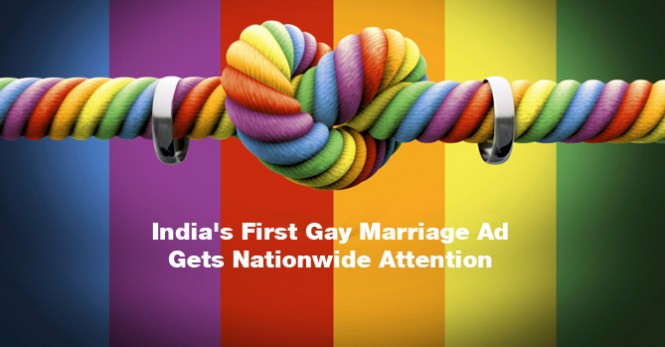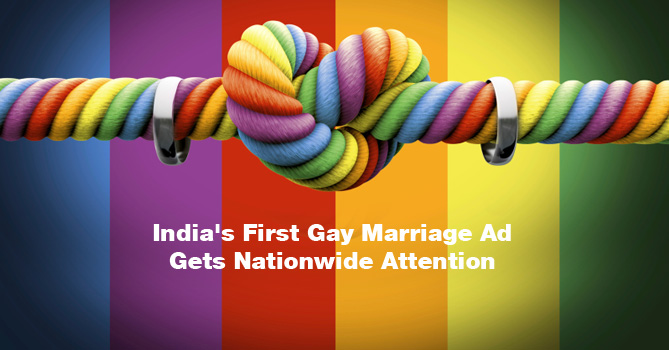 A Gay Marriage Advertisement
A Gay Marriage Advertisement
A matrimonial advertisement seeking a same-sex partner for her son, placed by a 57-year-old woman, broke many conventions and taboos despite much disapproval from orthodox quarters. Earlier this month, Mumbai resident, Ms. Padma Iyer, published an advertisement in the matrimonial section of the Mid-Day newspaper. Published on 19 May, it read: “Seeking 25-40, Well-placed, Animal-Loving, Vegetarian GROOM for my SON (36, 5’11”) who works with an NGO”. Ms. Iyer’s move to find her gay son, Harish Iyer, a suitable partner, immediately got nationwide attention. The advertisement was extensively shared on social media sites such as Facebook and Twitter and found overwhelming support as well.
In India, placing an advert such as this, is in itself a difficult proposition, it seems. Ms. Iyer had initially sought to place the advert with leading national daily, The Times of India (ToI). When the newspaper refused, citing legal hurdles, she approached the Hindustan Times. This paper did not provide a reason but turned her down as well. After being rejected a third time by DNA, the advert seeking an alliance for her son was finally published by Mid-Day.
Ms. Iyer’s advertisement is believed to have elicited over 150 inquiries. While most of these are promising, the responses include a fair share of abusive hate mails. According to her son, Ms. Iyer was doing exactly what any mother of an unattached 36-year-old Indian boy would – seek a partner to marry him and keep him company for life.
Who is Harish Iyer?
Harish Iyer (also spelt Harrish Iyer) is a popular LGBT and Equal Rights activist from Mumbai. The dynamic young man became a hit with young India due to his unique and creative take on spreading awareness and taking a stand. Even as social networking took India by storm, Harish Iyer, who is known by his handle @hiyer or Aham, took his brand of activism online.
Apart from LGBT Rights, Harish Iyer is also a keen child sexual abuse activist. He was featured in Stephen Fry’s documentary ‘Out There’ and in the popular Indian chat show, Satyameva Jayate. Iyer was ranked No. 71 on the World Pride Powerlist 2013 – the list of the 100 most influential LGBT people published by the British national daily, The Guardian. Iyer’s life has been an inspiration for a book called ‘The Bad Touch’ by Payal Shah Karwa and two films – I Am (directed by Onir) and Amen (directed by Ranadeep Bhattacharyya and Judhajit Bagchi).
LGBT Rights in India
While homosexuality was practised and perhaps even accepted in ancient India, it has been a taboo in modern times. Homophobia is not uncommon and despite increasing activism in support of LGBT rights in urban centres, the community has faced much abuse, violence, and neglect over the years. Members of the community are often victims of poverty, social ostracism, abandonment and physical abuse. Not much has been done to improve the lot of the LGBT community. With the advent of social media and associated freedoms, the youth of the country have become more vocal in their support of Equal Right.
Since 2009, a number of major cities in India have hosted Gay Pride and LGBT Pride parades – most of them with considerable turnout. India’s first online LGBT magazine, Pink Pages, was established in 2009 and since then, a number of publications have come out with reports, stories and opinion pieces supporting the community. Despite such progress, members of the gay community find “coming out” an extremely painful process, with families failing to provide any support.
Article 377
According to Section 377 of the Indian Penal Code, 1860, same-sex sexual activity is deemed a criminal offence. The tide against homosexuality seemed to change when the Delhi High Court, in 2009, ruled that Section 377 and all such legal prohibitions against same-sex conduct (so long as the activity is private, between adults, consensual, and non-commercial) violate the fundamental rights guaranteed by the Indian Constitution.
This victory for the gay community was, however, short-lived. On 11 December 2013, the Supreme Court of India set aside this order once again criminalising homosexuality. The Supreme Court also suggested that a comprehensive legislation to cover the LGBT community be crafted by the Parliament. Despite a joint petition by the Central government and several NGOs in 2014, the Supreme Court has refused to change its stance. This stance has opened up the community to abuse and harassment.
In Sync With Ireland
Shortly after Ms. Padma Iyer placed the advertisement in India, gay marriages found overwhelming sanction from a different part of the world. On Saturday, 23 May 2015, Ireland became the first country in the world to approve gay marriage when it came out in overwhelming support of same-sex marriage in a referendum vote. The Irish mandate was a clear one, about 62 percent of votes were cast in favour of gay marriage. The change, in a country that held homosexuality as a crime till about 1993, is a remarkable one.
Within a week of the Irish vote, popular opinion in Italy also seemed to be changing. The Italian daily La Stampa published a poll that showed majority support in favour of same-sex marriages. Other countries such as Spain and Portugal also recognise same-sex partnerships but have stopped short of sanctioning marriages. The Vatican, though, is clearly unhappy with traditionally Catholic countries such as Ireland and Italy supporting gay marriages.




